Lost in Caesaromagus
Robin Marchal
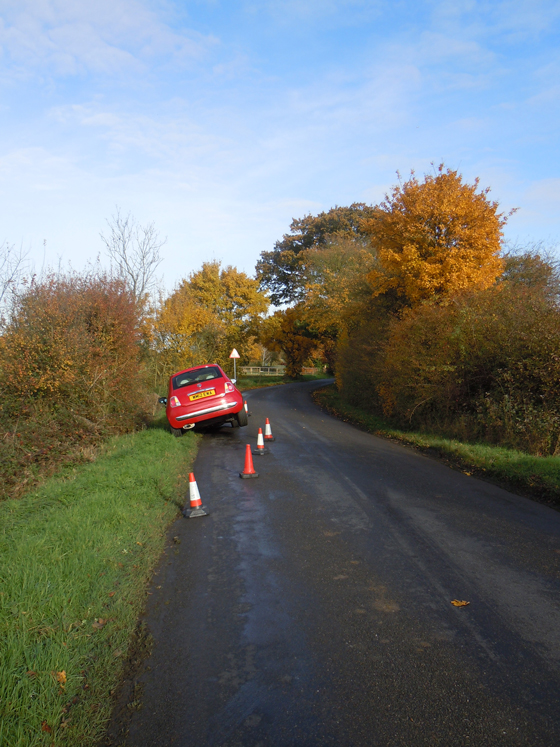
I am scuffing along Hollow Lane '... so deep and noisome in many places that the Queens liege people cannot pass through but in great danger'.1 That was in 1591. The thick ditch still seeps with dead leaves beneath brambles and gives wicked invitation to all. There's a small, new red car abandoned. Its young owner is in tears somewhere - lost with thoughts that her Dad had just bought it for her seventeenth birthday. Last year it was a fire-engine, a cart and a horse and a useless old labourer, ousted from his nearby tied cottage, tumbled on the way to the workhouse when his joints would bend no more. I suppose they had all drifted.
'Who could say what is phantom, what is real, as we embrace the world?'2 asks Theodore Wilson Harris. Via the world and his Amazonian homeland, Guyana he drifted into Kings Road, Chelmsford, in 1986 and stayed. I am drifting from my home, in this northern rural wedge, towards the County Town of Essex to invite it to speak to me.
Across a field of rapeseed is Priors farm. Walter, the Augustinian canon, glides in a black- cowled haze past his half-timbered priory, a 'right' of his eight-mile distant Motherhouse of Blackmore. In 1527 he went with his Prior to London to answer questions, which led to its being liquidated and granted, with its endowments, to Cardinal Wolsey.3 Priors is now a stockbroker's home - stock, not as in animals, but as in bulls and bears and amassed shares. Oliver Goldsmith's poem, The Deserted Village relates that, 'The man of wealth and pride takes up space that many more supplied.'4
Along the pounded cracked clay of an ever-widening footpath, I side step onto a razor sharp flint-stone, knapped by the plough to let a shaggy dog and its mate stake again their right of way across the fallow grass land. The farmer won't be happy. He thinks it should have been covered by houses years ago! Ahead, a stretched army of red brick encroaches. Am I wading, like Wilson Harris' narrator in The Guyana Quartet, "with webbed and impossibly half spidery feet" into a "ceaseless boiling current of creation?"5 No. What I breach is a rat run brick alley with a one tree landscape and an unheeded 'clean up after your dog' sign set on a creatively barren triangle of green.
My expectations rise. I am in Quilp Drive, then Magwitch Close, Sowerberry Close, Dombey Close, in and out, in and out, and then open into the sameness of Oliver Way. Is this outreach of 1980s housing a city paying court to literature and learning? Dickens does not get a mention on the blue plaque, which identifies the site of the Black Boy Public House in Springfield Road, where he stayed in 1835. But then he did say the county town of Essex, was "the dullest and most stupid spot on the face of the Earth," with nothing to look at save, 'two immense prisons large enough to hold all the inhabitants of the county.'6 And this, because none of the shops sold Sunday papers and 'the only book [he] had seen was Field Exercises and Evolution of the Army!' He should be grateful that a Chelmsford estate be named after his works. George the Fourth and The Iron Duke7 also stayed in The Black Boy. Its name was probably of little significance to them – or indeed to Dickens – yet perhaps today his renovated thinking would rail against the belittlement of humans in referring to a grown man as a Black Boy. I can only wonder how Wilson Harris would view it? Or Dickens? But in 1961 it was sold, razed and modified to become a home to Boots and . . . Next!
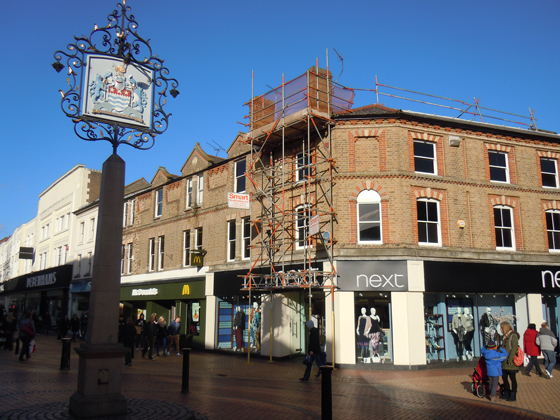
Caesaromagus, Caesar's Market is the only town in Roman Britain with the gall to incorporate the name Caesar. A market is a meeting place for people, an opportunity for the exchange of thoughts, of goods as well as engendering a spirit of relationship. From being a fort raised after the defeat of Boudicca in AD 61, it became, in 1199, the 'Norman new town' Chelmsford, with Assize Courts. The cobbled high street is now pedestrianised and cobbles and cobblers have gone. Was Next once a twisting half-timbered tenement before high, heavy Georgian right angles gave way to minimalist boxes? I quite like Next – as a new build. The blue plaque is under the scaffold. The sun dazzles today on the surviving façade of the creamed Saracen's Head Hotel. Each letter in its name is in bold stone relief with a dark shadow underneath. If the sun and I stayed long enough would the shadows give me the time of day? A squared coaching entrance leads to once-upon-a-time stables and rooms for overnight fun, ale and spirited tales of roads. 'The highwayman got nuffin' this time. And nearby Waterloo Lane? That used to be Shytehouse Street! That’s refined.'
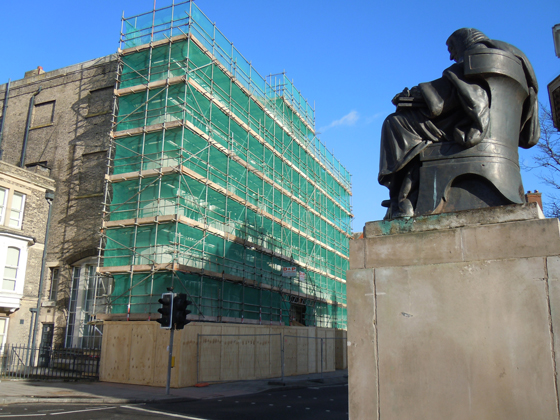
Stony Judge Tindal sits on his plinth, at once eying the Shire Hall but with his back to the curved conclave of eighteenth century pubs, shops and integrated homes named after him. But they are not there. I stare blankly at the solid red brick walled service yards of precinct shops put there in their place in the 1960s. I stand stock still, searching for any surviving spirit in "the solid wall ... of trees ... filled with ancient blocks of shadow and with gleaming hinges of light;" for "volcanic myth and substance ...."8 Oh. People are looking at me. I'm uneasy. They're uneasy.
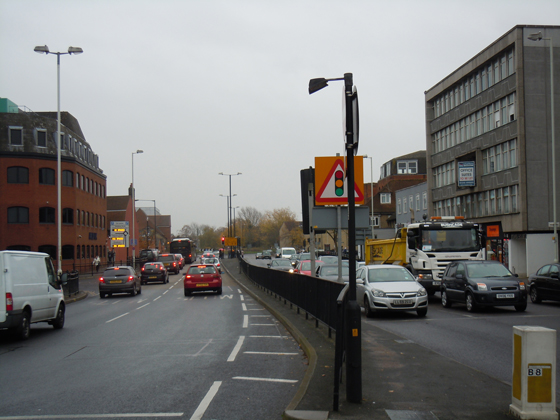
The Roman bridging point of the rivers Chelmer and Can is now crossed by a two hundred year old humped bridge. I trace the bulbous stone balustrade caked in moss and dried pigeon shit. It scuffs like coarse sandpaper. Chattering crowds merge and move as faceless obstacles. I turn. I cannot face the 1960s dual carriageway, ironically named Parkway. It has, once more, cracked the town in two. I watch shoppers wait for the traffic lights to change. They want to cross to their homes in Moulsham. In 2011 one person mistimed the lights – and died. Perhaps it symbolises the lethal effect of commercial planning!
Chelmsford's one prison is running down. It is only half-full. But even empty it could not contain even the city’s hybrid 170,000 population. After the short sleepover in a dormitory of estates, suited workers are dropped off by partners to commute to London or drift to more congenial and picturesque places in other of the Home Counties or retire to the quiet reaches of East Anglia. A laptop hits me on the thigh. Its owner’s head is in his I phone App, studying his memory map! "The station is just there! Idiot!" I want to shout. Can city status, granted on the 12th March, 2012, affect the prevailing aura of think now and tomorrow, serve time, be commercial then leave?

A block of red brick flats has risen above the Victorian rail viaduct. New. Centrally placed. Heartbeats through the night. Do the occupants step into the silent screams of the late night-time ghosts of Matthew Hopkins' hanged witches near Shire Hall or seek those spirits furtively at rest in the dark passivity of the Cathedral cemetery? Probably the ancient ghosts fled decades ago to escape the high decibel disco of Dukes in Victoria Road. Yet some ghosts must be high-spirited! Maybe then . . . Maybe. What is meant by the 'dead of night' or that a place is 'dead'?
The city covets nearby villages as dormitories. To the east, Springfield was, in 1770, a separate village. I look, through grainy panes of yellow glass in Dukes' Cottages, at Oliver Goldsmith staring across the green at the ancient flint church. He is in anguish of a community's subjugation as the 'One only master grasps the whole domain . . .?'
'Sweet smiling village loveliest of the lawn,
Thy sports are fled and all thy charms withdrawn;
Amidst thy bowyers the tyrant's hand is seen,
And desolation saddens all thy green:'9
But the village fights back, groping for identity – Dukes' Cottages now have a blue plaque to Goldsmith's memory!
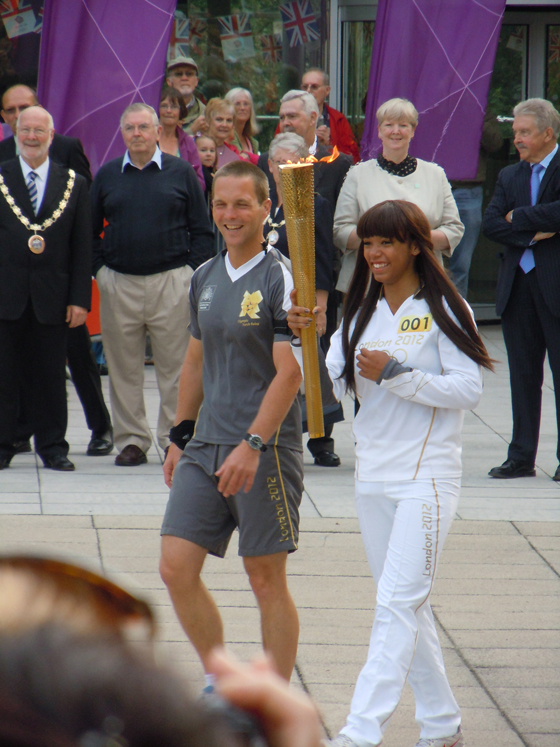
New Street bears evidence of the town as a magus, an industrial innovator. Beyond white untamed buddleia and a squatters' track to an unhinged first floor window, a blue plaque on the stock brick façade reads: 'Guglielmo Marconi 1874 – 1937. The Father of Wireless. From this site was transmitted Britain's first official radio broadcast by Dame Nellie Melba on 15-06-1920.' A head-turn away are the spreading curves and glass of Anglia Ruskin University, memories of the Olympic flame, but also the site of Hoffman's, creators since 1898 of ball bearings with 'an accuracy better than 1/10,000 of an inch.'10 The Germans recognized its significance and on the 19th December 1944, at one-thirty in the morning landed a V rocket on the site. Thirty-nine men and girls died. Hoffman's survived later raids, but is now merely a road sign to an imprint of memory.
"We tend to live our lives on the surface and eclipse those deep and incredible resources" says Wilson Harris. "It happens on the individual as well as on the cultural level." Surviving as a beacon to industry, Marriages' yellow stock, multi-storied, many-windowed Victorian mill sits nearby on the west bank of the River Chelmer. Has this extensive Quaker family, residents for centuries in this part of Essex, founders of local schools, creators of labour, managed to evolve and modernize their production methods but retain an intimate union with the past?
'It is the job of artists to open doors and invite ... the unknown, the unfamiliar; it's where their work comes from ... .'11 In this way new place is discovered and deep seeds of need are sown and thrive.
Kings Road arches long; two unbroken terraces of 1950s houses linked though a paucity of money and imagination, each with its same front door and gated path of independence. It gave hope to an expanding and rightly expectant post World War II population. A grass swathe, between pavement and road, houses dog muck after dark. Am I back in the 1940s with Wilson Harris, on an expedition into the broad leaf forests of the Amazon jungle? There's a blue plastic paddling pool with floating detritus, a mossed sand box, a bicycle with one wheel, a shabby chipped car with its bonnet up and occasional drafts of movement behind windows shaded with lace. Is there a mangrove swamp in the paddling pool? There are Lesser Antilles beach palms in the sandbox. I know that, somewhere, in this Kings Road of Council houses, Wilson Harris's "kingdom of man, turned into a colony and battleground of spirit!"
In 2010, the newly knighted, ninety-one-year-old recalled, "We had friends ..." nearby. " .... it is a pleasant place to live ... green spaces ... a cricket ground ... close to London. The people are very friendly here."12

Elsewhere, perhaps, he answered his own question, "Am I part of that scattering of minute seeds which reaches through and beyond what is known as fixed regions?"13 By his drifting with the 'unfamiliar,' apparently getting lost from his past, perhaps Caesaromagus can now claim Harris as one who found his way home?
I get home and find a mallard has landed on my garden pond! I have never known this happen before. I am lost.
Notes
1 Ed. K. Searles, Broomfield 81, Broomfield Parish Council, 1981, 40.
2 Wilson Harris, The Ghost of Memory. (London: Faber and Faber Limited, 2006), 19.
3 Andrew Smith, Blackmore Through Changing Scenes. Smith, Andrew. Changing Scenes. http://www.blackmorehistory.co.uk/blackmore_through_changing-scenes.html 2005. Blackmore Priory's rights included one in Broomfield.
4Oliver Goldsmith, 'The Deserted Village' in The Complete Poetical Works of Oliver Goldsmith, Ed. Austin Dobson, (London: Oxford University Press, 1907), 32; subsequent page references in the text.
5 Wilson Harris, The Guyana Quartet, (London: Faber and Faber, 1985); subsequent page references in the text.
6 Russell Thompson, Around Chelmsford, (Firth Book Company Limited, 2001).
7 http://pubhistory.com/Essexpubs/Chelmsford, accessed 5th February, 2013.
8 Wilson Harris, The Guyana Quartet, 82.
9 Oliver Goldsmith, 'The Deserted Village', 24.
10 Hoffmann's Ball Bearings: www.hoffmannballbearings.co.uk
11 Rebecca Solnit in A Field Guide to Getting Lost, (Edinburgh: Canongate Books Ltd, 2006), 5.
12 Martin Green, Author Knighted in Honours List, (Chelmsford: Essex Chronicle, June 17th 2010).
13 Wilson Harris, The Ghost of Memory, (London: Faber and Faber Limited,2006), 7.
About the article
Lost in Caesaromagus
I have a love hate relationship with the City of Chelmsford, County Town of Essex – or should that be County City? But I've lived within three miles of its centre for thirty six years. The genre of Memory Mapping provided me with a literary platform to look at it again through refreshed eyes and record my reactions.
Theodore Wilson Harris was knighted by the Queen in 2010. A world renowned novelist, poet and academic, he has lived and written from his home in Chelmsford since 1986. He was an inspiration to me as I drifted and formed my reactions to the County Town.
About the author
Robin Marchal
Robin Marchal graduated with an MA in Theatre from the University of Essex in 2012. His ten minute play, The Aspie Kid was selected for performance in The Lakeside Theatre in June, 2012. He has worked as an actor, following training at the Webber Douglas Academy of Dramatic Art, as well as a theatre director, playwright and cab driver.


